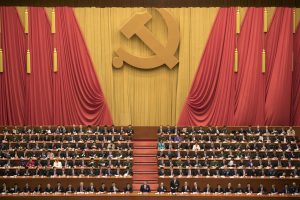The 20th National Congress of the Chinese Communist Party (CCP) has a date: It will begin on October 16, according to a state media summary of a CCP Politburo Central Committee meeting held on August 30.
The National Congress will select the CCP’s – and, by extension, China’s – top leaders for the next five years, although in practice the question of who will make the various leadership bodies is determined well before the CCP delegates make it official through their votes at the Congress. Since the reform and opening era, the Party Congresses have become routinized, occurring every five years, usually in October or November.
The 20th National Party Congress will be especially closely watched because Xi Jinping, the party’s top leader, is widely expected to break with recent precedent and hold his position for a third five-year term. There were early indications of this at the previous Party Congress in October 2017, when no apparent successor to Xi made it into the Politburo Standing Committee, the top leadership body in China. Xi’s bid for a third term – and possibly longer – became even more apparent in March 2018, when China’s legislature approved an amendment to the constitution that removed term limits on the position of president.
Holding the position of CCP general secretary for more than two Party Congresses flies in the face of admittedly recent precedent, with only Jiang Zemin and Hu Jintao sticking to that pattern. Xi taking a third term would also break the unwritten “seven up, eight down” rule, which effectively puts age limits on Politburo Standing Committee membership: Those aged 67 or younger are eligible for another term, while those 68 and above would be expected to step down. Xi is 69.
Ironically, Premier Li Keqiang is 67 this year, and could in theory be eligible for another seat. But he has already announced that he will not hold the premiership for another term, raising speculations that he will also bow out of his position on the Politburo Standing Committee. Li’s recent activities could be read as a farewell tour of sorts, particularly his August inspection tour of Shenzhen, invoking the legacy of Deng Xiaoping and stressing the importance of the “opening up” policy Deng spearheaded. With mounting signs that China is headed in the opposite direction – toward stronger CCP control over the economy, including restrictions on foreign businesses – Li’s sentiments could be read as a sign of subtle resistance from a man on his way out.
Xi’s continued dominance of the CCP is the only certainty heading into the 20th Party Congress. Who else will join him on the Politburo Standing Committee – or even the more basic question of how many, as the number of PSC members sometimes fluctuates – will be closely watched as a sign of just how tightly Xi controls the levers of power and what the CCP will focus on for the next five years.
In addition to the leadership lineup, the Party Congress will also feature a work report that essentially reviews progress made over the last five years and sets the general tone for the next five. The report will contain valuable insights into Xi’s plans for China’s economy and foreign relations, as well as its approach to Taiwan. Xi’s speech in 2017, for example, highlighted his ambitions for China’s military and foreshadowed a tougher policy toward Taiwan.
While not a primary concern, the timing of the 20th Party Congress also would allow for Xi to attend one or both of the multilateral summits he is rumored to be eyeing: the Shanghai Cooperation Organization summit in Uzbekistan from September 15-16 and the G-20 summit in Indonesia from November 15-16. Xi has not traveled outside of China since the COVID-19 pandemic hit, but this month has seen a flurry of rumors about his impending international travel. A major multilateral summit would be a good candidate for Xi’s first foray outside China in nearly three years, as he could maximize the impact with sideline meetings.

































